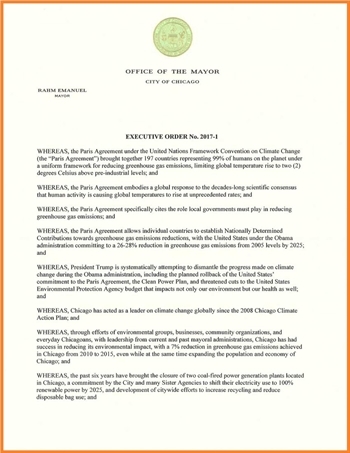Here at the Metropolitan Planning Council, we think every day about the sustainability of our region. So, it should come as no surprise that my colleagues and I were elated when Mayor Emanuel announced committing the City of Chicago to the Paris Agreement. We applaud this bold leadership to ensuring our city’s role in the global challenge of reducing greenhouse gas emissions and protecting the citizens of today—and tomorrow—from the impacts of climate change.

To read Mayor Emanuel's executive order on Chicago's commitment to the Paris Accord and fighting climate change, click the photo above.
Emanuel’s announcement reinforces Chicago’s staunch track record on climate action, including the Mayor’s recently announced target of powering all of the city’s public buildings by 100 percent renewable energy by 2025. As a region, the metropolitan area of greater Chicago has been making huge strides in better managing our stormwater, building more bicycle and pedestrian infrastructure, greening our buildings and supporting transit-oriented development, the list can go on.
I’m so proud to be a Chicagoan!
No doubt there is much work to be done to meet these goals and uphold our values around the social, economic and environmental benefits of low-emissions and climate-resilient development. As we forge ahead, I offer these reflections on where to narrow our focus:
Mayor Emanuel’s Paris Agreement Executive Order offers another opportunity to intentionally incorporate equity into ongoing and future climate efforts. Our current abilities to cope with the challenges of climate change widely vary depending on where we live in the region. It is vital that the city makes a conscious effort to spread the policies, planning, incentive programs and investment required to reduce our greenhouse gas emissions to the parts of the Chicago region most in need of low-emissions and climate-resilient development: our low-income, minority populations most vulnerable to the threats of intense storms, heat waves and severe droughts.
These climate impacts come at a high personal cost for individuals and their communities. Chicago is no stranger to intense storms that cause costly urban flooding problems and basement back-ups. Heat waves drive up our energy costs and have literally taken Chicagoans’ lives. Severe droughts threaten our already-depleting drinking water supply.
Let’s get bold about what we can do at the local level. Mayor Emanuel’s Executive Order calls for input from local stakeholders including environmental advocates and community organizations, the business community and scientific experts, to name a few. The invitation for collectively advancing Chicago’s climate change mitigation efforts is clear.
It's time for us to get bold about acting on climate change at the local level.
So, let’s innovate! What about solar-ready or energy-efficient affordable housing units, community-scale solar or repurposing underutilized land for neighborhood-scale stormwater management? Not only are these innovative climate solutions, but they are opportunities to drive community and economic development in addition to being good for the environment.
Getting our electricity from renewable energy sources and operating energy efficient appliances saves us money on our utility bills. Siting stormwater improvements on vacant land supplies communities with beautiful green space that supports recreational opportunities as well as native biodiversity.
As an example, Cook County is already developing a handful of solar demonstration sites on rooftops and vacant parcels. This is an exciting step in the right direction, ripe for local community actors to ensure implementation for the myriad benefits to residents’ quality of life.
Which brings me to my final thought: Right now, we can heighten our own awareness, consciousness and vigilance around the climate change conversations happening (or not) in our backyards, at community meetings, during summertime block parties, with our Alderman’s office, etc. Let’s discuss what our risks are, what they have been (à la Federally Declared Natural Disaster in 2013), who is most vulnerable, and where to find opportunities to advance on-the-ground solutions across the city’s communities. Because we all deserve livable, sustainable neighborhoods.
An opinion poll released earlier this month suggests 68 percent of Americans wanted the United States to lead global efforts to slow climate change—I wonder where Chicagoans rank? Whether citizens think about climate change on a daily basis, or whether we get a jolt from a news story here and there, the City is moving ahead to take action—with or without us. By asking more questions, demanding equity and transparency, by voting with our time and talents and words, citizens can show our city in a garden that we, too, commit to a global movement to protect our planet.